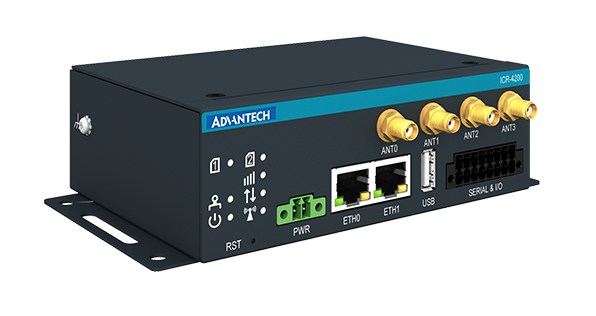Advantech ICR-4161 Series
Industrial 5G Router & IoT Gateway



- 5G NR Cellular Connectivity, Sub-6GHz
- 3GPP Release 16, Support both NSA and SA modes
- Quad-core CPU with 1 GB RAM
- 2x SIM, TPM 2.0
- 2x Gigabit Ethernet
- 2x Serial RS232/RS485, 4x DI, 2x DO
- ICR-4261: USB Host 3.0, GNSS Receiver, Micro SD Card
- ICR-4261W:Tri-Band WiFi 6, USB Host 3.0, GNSS Receiver, Micro SD Card
- Robust metal cover with wall and DIN mount options
- Wide operational temperature range
The ICR-41/4200 router family is a cutting-edge series of industrial routers that harness the power of 5G technology. Designed for the EMEA market it offers lightning-fast data transfer speed, low latency, and high network availability. Those 5G routers provide several advantages over 4G/3G/2G counterparts making them the ideal choice for a wide range of industrial applications.
Low latency is probably the most significant advantage of the 5G and ICR-41/4200 router family. By reducing delays in data transmission these routers ensure real-time responsiveness and make them well-suited for applications that require immediate feedback or interaction. Industries can benefit from seamless and instant communication regardless of their geographical location enabling to monitor and control critical processes with precision and accuracy.
The ICR-41/4200 router family is built on a powerful hardware platform with CPU 1.6 GHz that delivers sufficient performance for most todays applications. Advanced processor in combination with 1 GB RAM and 2.9 GB space for customer applications provide the necessary power to handle complex tasks efficiently. This enables industries to leverage the full potential of edge computing, empowering them to process and analyze data closer to the source resulting in reduced latency and improved operational efficiency.
As a standard is ICR-41/4200 router family equipped with two Gigabit Ethernet ports, one USB host 3.0, GNSS receiver, and two SIM readers, which are placed on the right side of the device. Optionally can be a router equipped with two serial ports (RS232/RS485), four digital inputs, two digital outputs, and also with WiFi 6 (IEEE802.11 ax/ac/a/b/g/n 2.4 GHz / 5 GHz / 6 GHz, 2x2 MIMO) and Bluetooth V5.2.
In terms of security the ICR-41/4200 router family prioritizes the protection of critical infrastructure systems. These routers incorporate features like TPM 2.0 and Tamper Button, ensuring the integrity and safety of data transmission. With robust security measures in place, businesses can confidently deploy these routers in sensitive environments knowing that their critical assets and information are well-protected.
Naturally, ICR-41/4200 offers extensive networking features and easy management capabilities. With their intuitive web interfaces users can configure and manage the routers remotely. The routers support multiple configuration profiles, automatic firmware updates, and customizable software options allowing businesses to tailor the routers to their specific needs. This flexibility enables seamless integration with existing systems and the implementation of additional features as required.
To streamline management and deployment of ICR-41/4200 router family can be easily managed using a comprehensive cloud-based tool WebAccess/DMP. This software tool enables centralized management, provisioning, and monitoring of multiple routers, simplifying the process of scaling and maintaining a network infrastructure or centralize management of VPN connections.
ICR-41/4200 router family represents a significant advancement in industrial networking. With advantages such as gigabit Ethernet speed, low latency, and high network availability, these routers empower industries to optimize processes, drive innovation and achieve operational excellence. Combining powerful performance, robust security, and easy management are ICR-41/4200 router family the perfect solution for demanding industrial applications enabling businesses to thrive in the era of 5G connectivity.

Specifications
| System | |
| CPU | Quad-Core ARM Cortex-A53, 1.6 GHz |
| Memory | RAM - 1GB, eMMC - 8 GB (2.18 GB for Router Apps, 474 MB for customer data, 231 MB for system data) |
| Watchdog | HW Watchdog |
| RTC | Battery backup RTC |
| TPM | Trusted Platform Module (TPM) 2.0 |
| Interfaces | |
| Ethernet | 2x Ethernet, RJ45, 10/100/1000 Mbps, isolation 1.5 kV |
| Serial Lines (ICR-4200) | 2x RS232/RS485 independently selectable by DIP switch RS232 (Tx, Rx, GND, RTS, CTS), RS485 (A(-), B(+), GND), 16-pin terminal block (no isolation) |
| I / O (ICR-4200) |
4x Digital Input (48 V / 3 mA consumption) 2x Digital Output (Open Drain, 48 V / 500 mA) 16-pin terminal block (no isolation) |
| USB | 1x USB 3.0 Host Connector |
| MicroSD Card | 1x Micro SD Card Slot |
| Reset Button | Reboot / Factory reset |
| LED Indicators | System, 3-level signal strength, Data activity, SIM1/SIM2 status, 3G/4G/5G technology, WiFi, User, ETH |
| Environmental | |
| Power Supply | 9 - 48 V DC (2-pin terminal block) |
| Consumption | Without WiFi: Idle 4.9 W / Average 6.8 W / Maximum 10.5 W With WiFi: Idle 5.5 W / Average 6.8 W / Peak 13.3 W |
| Sleep Mode | Yes, 10 mW |
| Operating Temperature | -40 to +75 °C |
| Storage Temperature | -40 to +85 °C |
| Humidity | 0 to 95 % |
| IP Cover | IP30 |
| Physical Characteristics | |
| Dimensionsm | 43 x 130 x 90 mm |
| Enclosure | Robust Metal Case, Grounding Screw |
| Mounting | Wall Mounting, DIN Rail |
| Weight | ICR-4161: 470 g ICR-4161W: 480 g ICR-4261: 490 g ICR-4261W: 500 g |
| GNSS | |
| Antenna | Passive antenna GNSS L1 band on the ANT3, L5 on the ANT1 |
| Systems | GPS, GLONASS, BDS, Galileo |
| Protocol | NMEA |
| Ac Time-to-First-Fix | Cold start: 27.93 s Warm start: 11.55 s Hot start: 1.09 s |
| WiFi - optional (ICR-4161W, ICR-4261W) | |
| Antenna | 2x R-SMA connectors, 2x2 MIMO |
| Standards | IEEE802.11 ax/ac/a/b/g/n 2.4 GHz / 5 GHz / 6 GHz |
| Data Rate | Up to 450 Mbps @ 2.4 GHz Up to 950 Mbps @ 5 GHz Up to 950 Mbps @ 6 GHz |
| Security | TKIP, AES, WPA, WPA2, WPA3, 802.1X |
| Modes | Access Point (up to 15 clients), Station, Multirole STA & AP |
| Bluetooth - optional (ICR-4161W, ICR-4261W) | |
| Antenna | Shared R-SMA WiFi antenna connector |
| Bluetooth | Bluetooth V5.2 |
| Cellular Interface | |
| SIM Slots | 2x SIM (Mini SIMs - 2FF) *1x Chip SIM (MFF2) |
| Antennas | 4x SMA connector |
| 5G NR frequency bands | 5G NSA Bands: n1/n2/n3/n5/n7/n8/n12/n13/n14/n18/n20/n25/n26/n28/n29/n30/n38/n40/n41/n48/n66/n70/n71/n75/n76/n77/n78/n79 Transfer rate: 3.4 Gbps (DL), 550 Mbps (UL) 5G SA Bands: n1/n2/n3/n5/n7/n8/n12/n13/n14/n18/n20/n25/n26/n28/n29/n30/n38/n40/n41/n48/n66/n70/n71/n75/n76/n77/n78/n79 Transfer rate: 2.4 Gbps (DL), 900 Mbps (UL) |
| LTE Parameters | LTE-FDD Bands: B1/B2/B3/B4/B5/B7/B8/B12/B13/B14/B17/B18/B19/B20/B25/B26/B28/B29/B30/B32/B66/B71 LTE-TDD Bands: B34/B38/B39/B40/B41/B42/B43/B48 LTE LAA: B46 Transfer rate: 1.6 Gbps (DL), 200 Mbps (UL) |
| HSPA+/UMTS Parameters | Supported frequency bands: B1/B2/B4/B5/B8/B19 Transfer rate: 42 Mbps (DL), 5.76 Mbps (UL)Industrial Cellular |
| Software | |
| Operating System | ICR-OS (Linux based) |
| SW Customization | Router App |
| Application Development | Open Linux, *Python, BASH, C/C++, *Node-RED, *Docker |
| Networking Features and Protocols | DHCP, NAT/PAT, SSH, VRRP, PPPoE, SNMP, SMTP, Dynamic DNS client, DNS proxy, VLAN, QoS, *DMVPN, NTP Client/Server, *Routing protocols RIP, BGP, OSPF, IS-IS, NHRP, Backup Routes, Port Forwarding, Host Port Routing, Ethernet Bridging, Load Balancing, IPv6 Dual Stack |
| Industrial Protocols and IoT | *Modbus RTU/TCP gateway, *IEC 60870-5-101 to 104 gateway, *DF1, *DNP3, *MQTT, *LWM2M |
| Security | HTTPS, SSH, SFTP, DMZ, Firewall (IP Filtering, MAC address filtering, Inbound and outbound Port filtering) VPN Tunneling - WireGuard, OpenVPN, *EasyVPN, IPsec with IKEv1 and IKEv2, GRE, L2TP, PPTP Authentication - RADIUS, TACACS+, 2FA, *SCEP Encryption - DES, 3DES, AES, RSA, MD5, SHA |
| Firmware Management | Automatic firmware updates - server, locally via LAN or remotely via WAN Over-the-Air cellular module firmware updates |
| Diagnostic/Log | Status - Signal Strength, Data Usage, Detailed Long Term Statistics One CLICK report - Current Configuration, Factory Identification, Routing Table Log - System Log, Reboot Log, Kernel Log Remote Diagnostics (via SSH) |
| Event Engine | StartUp script & Up/Down script (Own rules based on Digital Inputs, Network Parameters, Data Usage, Timer, Power, Device Temperature) Report Types: SMS, email, SNMP Trap |
| Configuration | Web server, SSH, Four configuration switchable profiles, Automatic configuration update from server, Backup & Restore configuration |
| Advanced Software Tools | WebAccess/DMP - Remote Device Provisioning, Monitoring & Management Platform WebAccess/VPN - Advanced Secure Networking Platform |
| Standards & Regulations | |
| Radio | EN 301 908-1, EN 301 908-2, EN 301 908-13, EN 301 908-25, EN 303 413, EN 300 328, EN 301 893 |
| EMC | EN 301 491-1, EN 301 489-17, EN 301 489-19, EN 301 489-52, EN 610000-6-2, EN 610000-6-3, EN 55032, EN 61000-4-2, EN 61000-4-3, EN 61000-4-4, EN 61000-4-5, EN 61000-4-6 |
| Safety | IEC 62368-1 |
| Transportation | E-mark |
| National | CE, UKCA |
| Mechanical | EN 60529, EN 60068-2-27, EN 60068-2-64 |
| Climatic | EN 60068-2-2, EN 60068-2-1, EN 60068-2-14, EN 60068-2-78 |
| Environmental | REACH, RoHS3, WEEE |
| Cellular Module Approvals** | Regulatory: GCF, CE, FCC, IC, PTCRB, RCM, CCC, Anatel, JATE, TELEC, KC, NCC Carrier: Verizon, AT&T, FirstNet T-Mobile, NTT, DT, TelstraIndustrial Cellular |
*Functionality is available with installed Router App
**- Approvals are valid for the integrated cellular module inside the router only. Cellular module approvals are not always applicable for the whole router - see "Standards and Regulations" chart for complete router approvals available
Ordering Information
| Model no. - Order Codes | REGION | 2x Gigabit Ethernet |
2x Serial RS232 R485 | GNSS | I/O | 1x USB Host 3.0 | 2x SIM | WiFi 6 | Bluetooth V5.2 |
|---|---|---|---|---|---|---|---|---|---|
| ICR-4261 | EMEA* | ✔ | ✔ | ✔ | ✔ | ✔ | ✔ | ||
| ICR-4261W | EMEA* | ✔ | ✔ | ✔ | ✔ | ✔ | ✔ | ✔ | ✔ |
| ICR-4161 | EMEA* | ✔ | ✔ | ✔ | ✔ | ||||
| ICR-4161W | EMEA* | ✔ | ✔ | ✔ | ✔ | ✔ | ✔ |
* - The router is compatible with cellular networks in the indicated region. The importer/operator needs to check locale legislation (standards, national Telecom approvals, etc.) and compare with standards available for the product if possible to operate the router in the target region legally.
 Kunden, die diesen Artikel gesehen haben, sahen auch
Kunden, die diesen Artikel gesehen haben, sahen auch













 Eigenschaften
Eigenschaften Beschreibung
Beschreibung Weitere Informationen
Weitere Informationen



 Eigenschaften
Eigenschaften Beschreibung
Beschreibung PDF
PDF